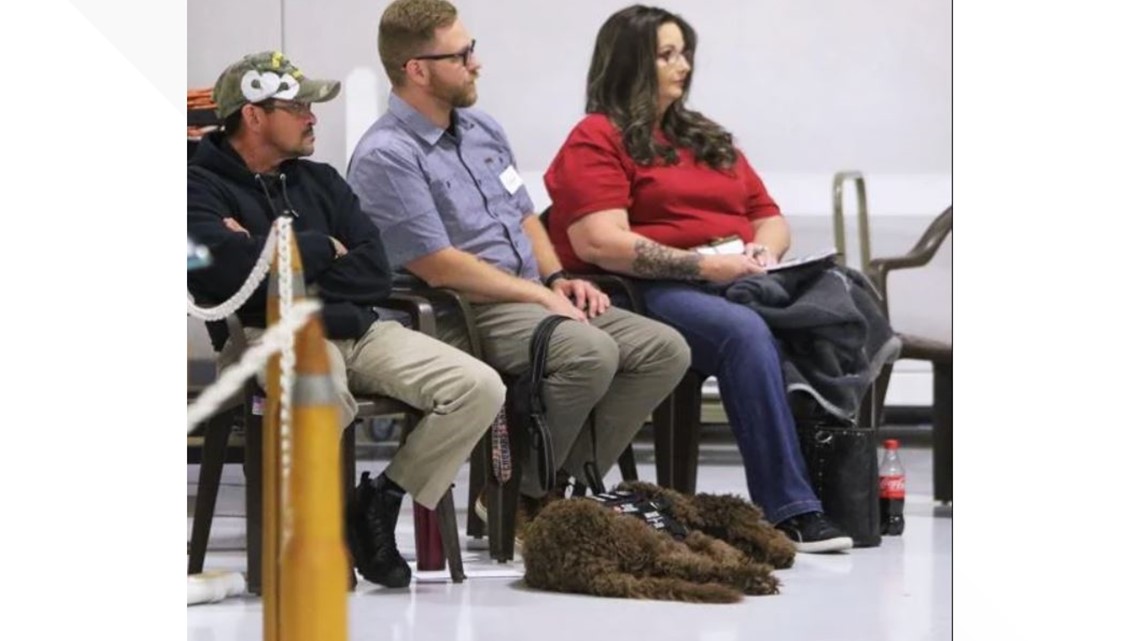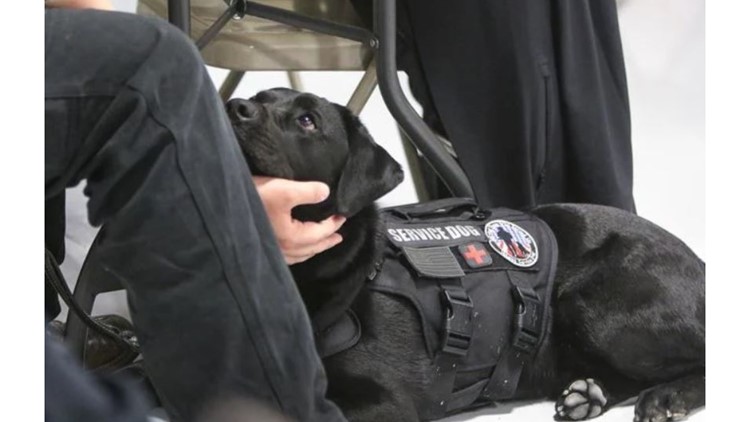NAMPA, Idaho — This article originally appeared in the Idaho Press.
Jay Bowen’s service dog, Normandy, might know his mannerisms better than his wife of 25 years. Recently, the Nampa resident started having seizures and Normandy already knows the signs.
Bowen, who served as a Marine in Arizona and Iraq, stood in the Warhawk Air Museum in Nampa on Tuesday, wearing a black beanie and a black Marine Corps sweatshirt. He instructed Normandy, a black lab, to sit by his side.
“He helps me in every way, just to enjoy life, on a daily basis. He makes me laugh,” said Bowen, who has had Normandy for a little over two years. “It’s the closest bond you can really have.”
Bowen had an interesting path to Normandy. A client of his dad’s ended up contacting Gina Esoldi, program director at Next Steps Service Dogs.
“He knew that I was going through some stuff,” Bowen said. “My dad got me in contact with Gina.”
Esoldi gave a presentation to the crowd of veterans gathered at the Warhawk Museum’s monthly Kilroy Coffee Klatch. At Next Steps Service Dogs, Esoldi selects and trains assistance dogs for veterans, primarily those with post-traumatic stress disorder or a traumatic brain injury.
Next Steps is based in San Diego and just celebrated 10 years. Esoldi has been there for eight years. The organization has certified around 150 service dog teams, primarily with veterans, though there are a few first responder teams, she said.
Her talk focused on the differences between service dogs, therapy dogs and emotional support dogs.
“There’s a lot of fraudulent dogs out there,” Esoldi said. “I want to believe it’s lack of education. I don’t think people intend their dogs to be fraudulent, they just don’t know, really know, what a service dog is.”
Emotional support animal is a pet that someone uses to feel better emotionally, she said. Psychiatrists can write a prescription for the support animal. It’s up to a facility whether the animal is allowed inside. There is no formal training required.


A therapy dog is a pet that is trained to serve other people, Esoldi said. The dog and handler go through a course to make sure it is obedient and has manners. The dog is only allowed to enter the public facility in which it’s working, she said. So for example, the dog can’t go to the grocery store.
Service dogs are defined in the American Disability Act. Such dogs are individually trained to work for people with disabilities, such as pulling a wheelchair or reminding people to take medications. They are working animals, not pets. Service dogs are also appropriate in public.
“By law, you can ask two questions. Is that your dog serving a disability and what task or work does that dog perform?” said Esoldi, who said emotional support dogs do not fit the criteria of performing tasks.
It’s important to not interrupt the work of service dogs, Esoldi said. For example, whistling at dogs or interacting with them is inappropriate.
When it comes to advice, Esoldi said raising a puppy is tough. She also recommended Assistance Dogs International.
“It causes a lot of stress,” she said, to laughter. “Do find yourself the right trainer.”
Normandy came to Bowen already trained, but he still trains him every day.
But for veterans like Bowen who have seizures, a service dog can bring peace of mind. What dogs can do is “amazing,” Bowen said.
“He knows me pretty good now,” Bowen said.
This article originally appeared in the Idaho Press. Read more at IdahoPress.com
Watch more crime news:
See the latest Treasure Valley crime news in our YouTube playlist:



